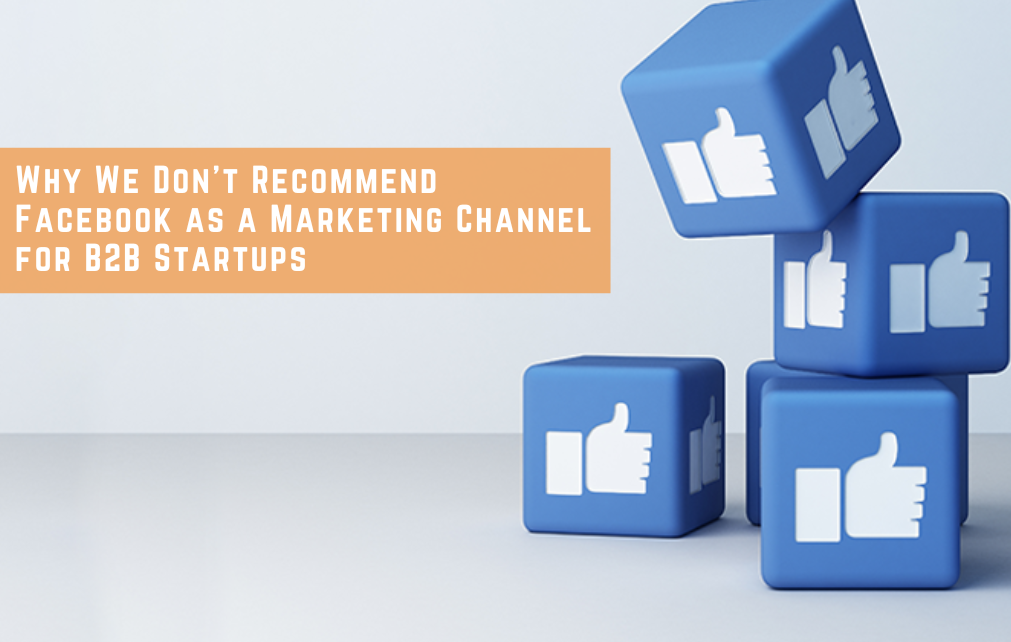3 min read
Why We Don’t Recommend Facebook as a Marketing Channel for B2B Startups
![]() Kirill Ougarov
:
May 10, 2022
Kirill Ougarov
:
May 10, 2022

While established companies and well-funded startups with large marketing teams and budgets can go after all available marketing channels, smaller businesses should choose their battles wisely. And the advertising channel we are least likely to recommend in B2B Technology is Facebook.
Facebook advertising may be tempting to invest in based on historical performance, and Facebook's conventional wisdom. Despite facing headwinds, it remains the world’s largest social network and thus may seem like a promising channel. However, we don’t recommend that B2B startups invest in Facebook. Here’s why:
1. Platform shifts away from brands.
In 2018, Facebook announced shifting its algorithm away from brand and media posts towards favoring personal content. Since then, it has become considerably more difficult for brands to build audiences for their pages and grow their reach organically. Additionally, the platform has also shifted emphasis away from the news feed in general in favor of Groups, further limiting potential organic reach.
2. User mindset.
For the most part, people are not in a business-focused mindset when using Facebook (and, to some extent, its corporate cousin, Instagram). Instead, they’re more likely to be interested in engaging with their connections or discussion groups or shopping, making them less likely to be responsive to business-related content (or ads). This psychological aspect is one of the reasons why LinkedIn works much better for B2B, as LinkedIn focuses on business-related activities. Thus users are almost certain to be in a business-focused mindset while using the platform. (We know, Captain Obvious but, we had to say it.)
3. Targeting challenges.
One of the aspects that made Facebook a popular channel for digital advertisers back in the day was its powerful and precise targeting options. Unfortunately, many of those detailed targeting options have been removed due to various controversies. Few of the remaining targeting options are related to professional attributes since Facebook does not focus on collecting that data, leaving retargeting and list-based lookalike audiences as the most promising options for its B2B advertisers.
Sadly, these won't work unless your site gets significant traffic or you have an extensive contact list. While Facebook can create a lookalike audience based on just 100 contacts, it recommends using a list of at least 1,000 contacts. Since you only want to use a fraction of your contacts to create a lookalike audience (for example, SQLs and Opportunities), you need several thousand contacts to create well-matched lookalike audiences.
4. Confusing ad policies.
Facebook’s ad policy page is about 4,000 words long, not counting the many subsections linked from that page. Ad reviews are almost entirely algorithmic, meaning that your ads are unlikely to be seen by a human employee.
Facebook's algorithmic ad review raises the possibility that your ads could be misinterpreted. For example, ads for standard B2B offers like webinars and whitepapers could be mistaken for job ads, which Facebook treats differently from other ads. Accidentally, your ads could be declined or banned with no recourse. A review can take weeks or months or never actually happen – far too long if you’re trying to grow and develop a channel.
What's the alternative?
Instead of taking a chance on Facebook, we recommend a combination of LinkedIn and paid search ads (we'll say it — Goole Ads) for demand generation and demand capture, respectively.
We have found that startups focusing on emerging technologies may not have the luxury of existing demand to capture. Specifically, Google Ads search volumes for their product/service keywords are too low, and we can't spend the budget they give us. People aren't searching for what the startup sells because the B2B target doesn't know they need it! Or that the technology solution exists to their problem. Ouch.
BUT almost all can benefit from leveraging LinkedIn as a marketing channel. LinkedIn can be relatively expensive at $50 to $150 cost per lead, but the leads are generally in your line of business (at the very least).

Why LinkedIn?
Because it's a professionally-oriented social network, LinkedIn is a natural fit for B2B startups. Its algorithm does not disadvantage content posted by company pages; users are in a business-focused mode when using the network and thus are responsive to business content. Ads can be targeted entirely by professional attributes such as job title and industry instead of personal ones.
Using LinkedIn makes it easy to reach people that match your buyer personas. While click costs are higher than on Facebook, the clicks are much higher quality when your targeting is set up well. Like Facebook, LinkedIn also offers the ability to create retargeting and list-based lookalike audiences.
Additionally, building your brand on LinkedIn can help with recruiting and marketing. The network is a popular destination for job seekers both as a source of job opportunities and a tool for researching prospective employers. As a B2B startup, if you only have the resources to build a following on one social platform, it should be LinkedIn.
Need help with your LinkedIn?
Schedule a free consultation to see how we can help you get the most out of your LinkedIn and Google Ads spend, in combination with your other great content inbound marketing channels like white papers, webinars, case studies, blogs, and more.
